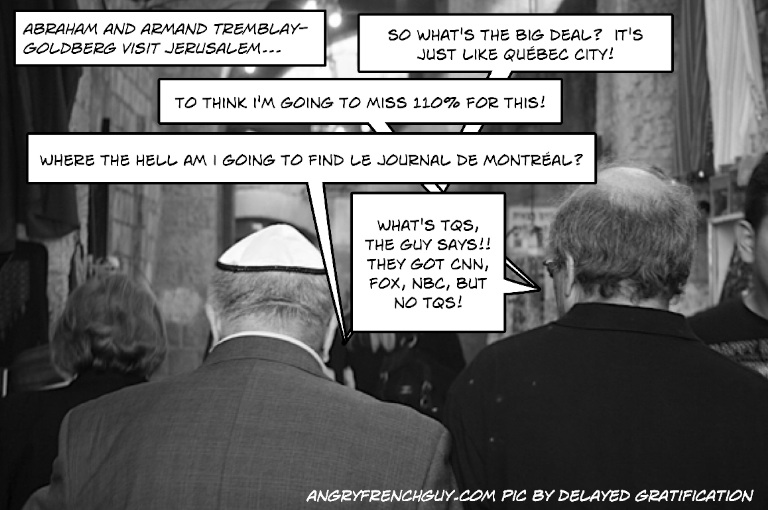Québec Needs More Jews

If English is good enough for Jesus, it’s good enough for me.
-Apocryphal quote attributed to, among many, Texas governor Miriam Ferguson and South Carolina senator Strom Thurmond.
How about Moses? Did he speak English?
A recent poll by the Association for Canadian Studies revealed that 41% of Quebecers felt Jews did not « want to participate fully in society » and 35% felt that Jews had not « made an important contribution to society. » In the rest of Canada, 72% felt Jews wanted to participate in society and only 10% did not feel they made an important contribution to society.
As usual, these results were explained as being either symptomatic of Québec’s cultural insecurity or further proof of the rampant anti-semitism simmering just beneath the surface of Québec society. In any case, Jack Jedwab, the executive director of the ACS, was quoted in the Canadian Jewish News saying that these results « do not support the idea that Quebec has had successful intercultural programming. »
But what if these results simply reflected a fact? What if many Québec Jews did not want to participate in Québec society and what if their contribution to this society was, if not minor, less important than their contribution to other cultures?
The question that the ACS did not ask is: Do you wish Jews took a more active role in Québec society and culture?
Considering the considerable influence of people of Jewish decent in academia, arts, culture, literature and business, there are worse things that could happen to Québec than having a few Jews who have some allegiance to that small pocket of French-speakers shoveling away 400 cm of snow at the top-right of the North American map.
Québec, whether you like it or not, is a society that recognizes itself through the French language. Most of Québec’s Jews speak another language. This means that Jewish people are not as visible in Quebec‘s editorial pages, movies and television as their numbers on the streets of Montréal would suggest.
Hence, the simplistic conclusion that Jews do not want to participate in Québec society. They are here + they don’t participate = they don’t want to participate.
Of course you can’t generalize! Phyllis Lambert and Julius Gray’s contribution to Québec goes way beyond the « Anglo » or the « Jewish » community. David Levine gained moderate notoriety as the Parti québécois’ most famous Jew. But the fact is that from Leonard Cohen to Mordecai Richler, the Steinbergs to the Bromfmans, the majority of Québec’s Jews have defined themselves as Anglophone Jews.
It’s hard to make an important contribution to a society that defines itself almost exclusively by the use of the French language… in English.
Around 20% of Québec’s Jews are Sephardic Francophones but unlike the traditional community they are mostly from a recent wave of immigration and they have yet to establish their place in either Québec or Montreal’s Jewish institutions.
In the rest of Canada all Jews speak the same language as the rest of Canadians. In Québec, Jews and the French-speaking majority often don’t even go to the same schools!
This situation has it’s roots in the refusal of the Catholic Church to admit Jewish kids to Catholic schools in the past.
The fact is that the doors of Québec’s French-language public schools have been fully open to all confessions since 1977 and it’s Montreal’s Jewish leaders that have been at the front lines of the battle to preserve a separate English language public school network.
In 2005 they even briefly convinced the Liberal government to fund a parallel network of straight-out Jewish public schools until public outcry forced them to back down.
This segregation feeds the vicious of cycle of ignorance and distrust and that benefits no one. The people of Québec – old stock and new immigrants alike – are denied the opportunity to know and build relationships with Jewish-Quebecers for reasons that have nothing to do with religion, only with language.
Worse, French-Quebecers are estranged from a Diaspora that is very Francophone and Francophile, and from that other small country with the blue and white flag that knows a thing or two about independence, being a minority culture and protecting an endangered language.